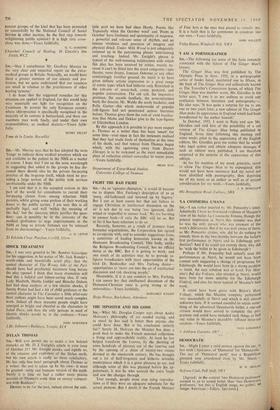DYLAN THOMAS
SIR,--Will you permit me to make a few belated remarks on Mr. D. J. Enright's article in your issue of October 21? Mr. Enright mocks, and rightly so, at the creators and exploiters of the Dylan myth, but his own article is really no more satisfactory. He has only Ibtic brief paragraph about Thomas as a writer; the rest is taken up by his .own—it must be granted—witty and humane version of the myth. Surely it is time we had a rather more precise account of Thomas's work than an uneasy compari- son with- Beddocs? •
Thomas is by far the best, indeed almost the only, lyric poet we have had since Hardy. Poems like 'Especially when the October wind' and 'Poem in October' have freshness and spontaneity of response, a powerful and relevant sense of rhythm, and an intense vividness and precision of imagery and physical detail. Under Milk Wood is not adequately summed up in the patronising phrase 'entertaining and touching: Indeed, Mr. Enright's phrase is typical of the well-meaning helplessness with which this play has been received by critics, mainly be• cause it can't be fitted into the usual categories—epic theatre, verse drama, lonesco, Osborne or any other comfortingly familiar ground. Its merit is to have given definite artistic expression to a great range of comic types which had hitherto only flourished in the sub-arts of music-hall, comic postcard, and popular conversation. The old salt, the inquisitive postman, the seaside landlady, the nonconformist bard, the deacon, Mr. Waldo the seedy bachelor, and Polly Garter—this whole underworld of popular folk-figures had not penetrated serious literature before. Thomas gives them the sort of vivid localisa- tion that Mshe and Dekker give to the type-figures of Elizabethan London.
By this approach it is possible to pay more respect to Thomas as a writer than has been 'smart' for some time—ever since in fact the reviewers realised that they had made fools of themselves at the time of his death, and that retreat from Thomas began which, with the squirming away from Doctor Zhivago, is to be reckoned as the most remarkable piece of collective critical cowardice in recent years. —Yours faithfully.
University College of Swansea














































 Previous page
Previous page